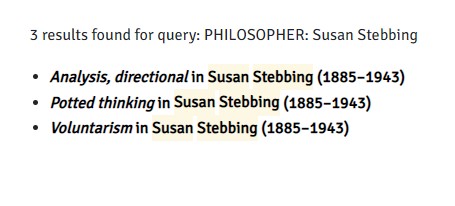What is the difference between logical and metaphysical analysis? According to Susan Stebbing, logical analysis is able to give an unambiguous meaning of a proposition:
If p is to be analyzed, then p must be understood. It follows that there is at least one expression which unambiguously expresses p.
By contrast, metaphysical analysis uncovers the “basic facts” on which the meaning of p to be analyzed is grounded:
If p is to be analyzed, then it is not always the case that p is known to be false, and it is sometimes the case that p is known to be true.
While logical analysis is set on the same level as the proposition, metaphysical analysis, insofar as it leads to basic facts behind the propositon, is “directional”. One of the advantages of this distinction is that it allows for excluding metaphysical issues from the inquiry. Stebbing’s approach to analysis may thus be considered “purpose-relative”.
“The grammarian does not need to pay attention to the letters of which the words are composed. Grammatical analysis remains at the same level because it is concerned only with the sentence, i.e., with words combined to express a complex meaning. In this respect it differs from metaphysical analysis. The metaphysician is concerned with what the words refer to, i.e., with the constituents there must be in the world if the sentence is so used as to say what is true.” (Stebbing 1932)
We have three ECC articles on Stebbing’s ideas:
If you are interested in Stebbing research, find Scholars from our New Voices network.
You may also visit the entry of Susan Stebbing in our Directory of Women Philosophers.
References
Stebbing, Susan (1932) “The Method of Analysis in Metaphysics.” Proceedings of the Aristotelian Society Vol. 33, pp. 65-94.
You cannot copy content of this page









